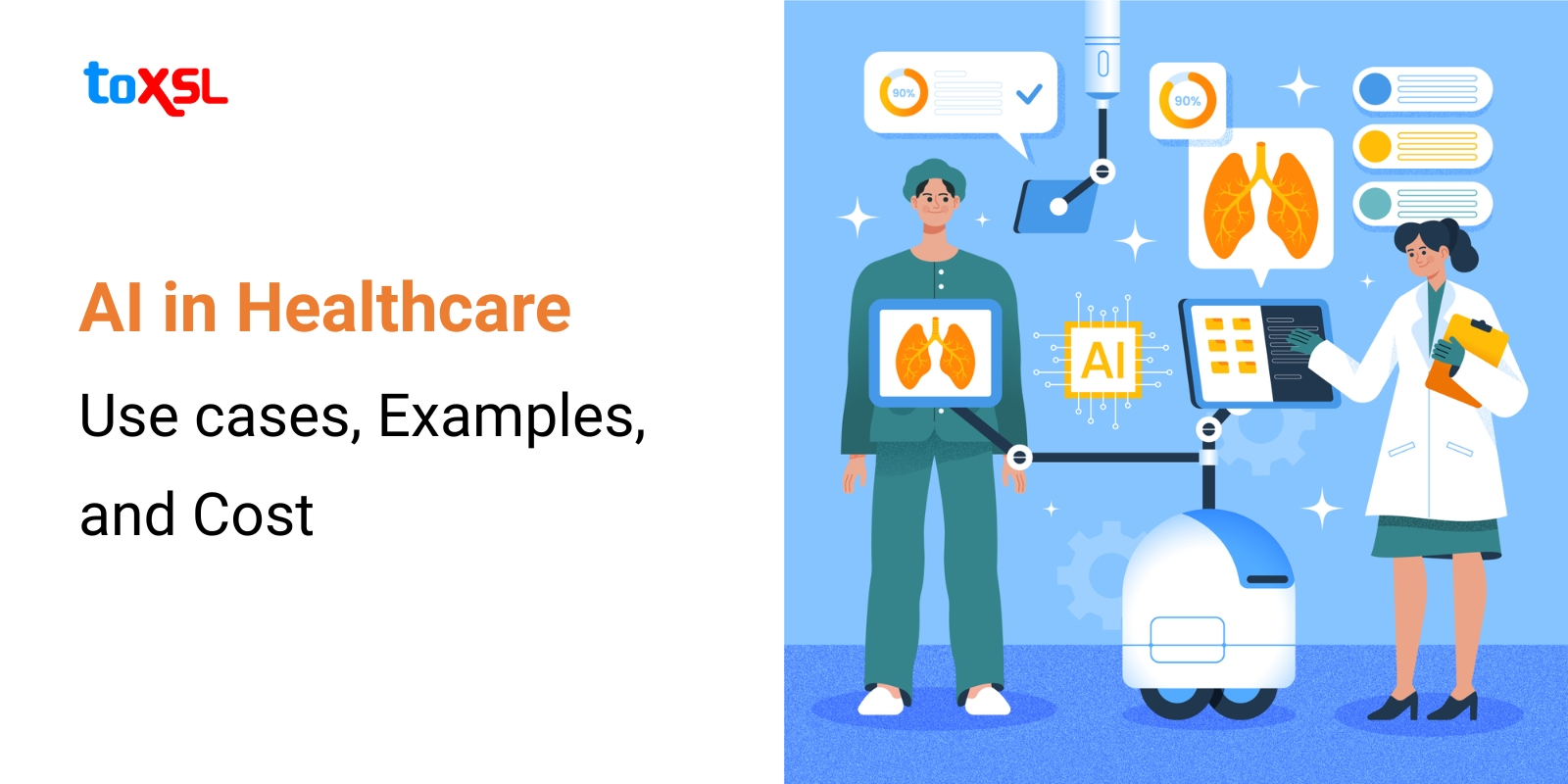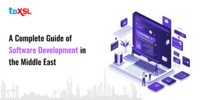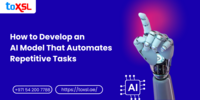- Jun 12, 2025
Share this post on:

The healthcare industry has advanced and become one of the most complex sectors. According to statistics, the global AI in the healthcare market is valued at $10.3 billion, growing at a CAGR of 49.1%. Today, healthcare is under tremendous growth, and the power of AI’s disease detection is helping doctors detect diseases more easily and accurately, streamline administrative tasks, and enable customized medicine via genomic analysis.
Key Components of AI in the Healthcare Industry
AI has evolved and is constantly revolutionizing how healthcare works. Here are the few components of AI in healthcare:
Machine Learning: Machine learning helps doctors by studying lots of medical information to spot patterns and guess what might happen next. It can predict how sickness will change, suggest the best treatment for each person, and help doctors make smarter choices based on facts.
Natural Language Processing: NLP in healthcare helps turn messy medical information, like doctors’ notes and research articles, into useful knowledge. It can automatically create reports, organize medical codes, and pull out important details from patient records and medical studies.
Computer Vision: Computer vision looks at medical images like X-rays and MRIs and understands them very well. Programs like Google’s DeepMind can spot eye diseases and breast cancer earlier than regular methods, helping doctors avoid mistakes.
AI Robots in Healthcare: Smart robots using AI help in hospitals by assisting with surgeries, helping patients recover, and taking care of them. Some robots also handle jobs like delivering supplies and cleaning. For example, the Da Vinci Surgical System helps surgeons do very precise, small surgeries that help patients get better more quickly.
Generative AI in Healthcare: Generative AI makes fake medical data that helps with research, creates new medicines, and plans treatments just for each patient. It can also pretend to run clinical trials, which helps make new drugs faster.
Deep Learning: Deep learning helps understand hard medical information like genes and pictures from scans. It helps doctors find rare diseases by studying this information carefully.
AI Agents in Healthcare: AI agents help take care of patients by watching their health, organizing work, and helping doctors and nurses work better together. They act like smart helpers in hospitals, making sure everything runs smoothly. You can work with AI experts to build these helpful tools.
Chatbots for Healthcare: AI chatbots are available anytime to help patients. They can check symptoms, book appointments, and answer questions. This helps doctors and nurses by doing some of their work and keeps patients getting help quickly.
Top Use Cases of AI in Healthcare
AI is helping healthcare in many great ways. It helps doctors find sickness faster, makes treatments just for you, and helps hospitals run better. Here are the top 10 ways AI is used in healthcare:
AI Helps Find Diseases: AI looks at medical pictures and test results to find illnesses quickly and correctly.
- Medical Images: AI can spot problems in X-rays and scans with high accuracy.
- Eye Disease Checks:AI checks eye pictures to find early signs of diabetes-related eye problems, especially where doctors are few.
AI Makes Personal Treatment Plans: AI studies your health and genes to create treatments that fit you, helping you get better with fewer side effects.
AI Helps with Medicine: AI helps make medicine plans, predicts how drugs will work for you and adjusts doses. It also helps people with long-term illnesses like diabetes.
AI Creates Precise Treatments: AI uses your genes and lifestyle to give you the best treatment.
- Radiation Therapy: AI plans radiation to target tumors and protect healthy parts.
- Immune System: AI helps make treatments that work with your immune system.
- Genetic Treatments: AI helps design special treatments for rare diseases.
AI Speeds Up New Medicine: AI helps find new medicines faster by studying molecules and guessing how well drugs will work.
AI Watches Patients Remotely: With smart devices, AI keeps track of your health signs all the time. This helps catch problems early and keeps you out of the hospital.
AI Helps in Surgeries: AI robots help doctors do surgeries more precisely. This means you heal faster and have fewer problems.
AI Automates Tasks: AI does simple tasks like booking appointments and handling bills, so doctors and nurses can spend more time with patients.
Benefits of AI in Healthcare
AI is helping healthcare in many great ways that make life better for patients and doctors. Here are some of the main benefits:
Finds Diseases Early and Accurately: AI can look at medical images and data quickly to spot diseases sooner and more precisely than before. This helps patients get treated early, which can save lives.
Helps Doctors Make Better Decisions: AI gives doctors smart advice based on lots of medical information. This helps avoid mistakes and find the best treatments for each patient.
Creates Personalized Treatments: AI studies your health, genes, and lifestyle to make treatment plans just for you, so the care fits your needs perfectly.
Saves Time and Reduces Workload: AI can do many routine tasks like scheduling appointments or checking records. This frees up doctors and nurses to spend more time caring for patients.
Monitors Patients Remotely: AI works with wearable devices to watch your health all the time. This helps catch problems early without needing to visit the hospital often.
Speeds Up New Medicine Development: AI helps scientists find new medicines faster by analyzing lots of data and predicting which drugs will work best.
Improves Hospital Operations: AI helps hospitals manage staff, supplies, and equipment better, making healthcare faster and less expensive.
Supports Mental Health: AI tools can also help with mental health by providing support and monitoring.
Empowers Patients: AI gives people tools like apps and wearables to understand and manage their health better.
Reduces Costs: By catching diseases early and improving treatments, AI helps lower healthcare costs for everyone.
Real-Word AI in Healthcare Examples
AI is already helping hospitals around the world. It helps doctors find diseases faster and makes hospital work easier. Here are three real examples:
Mayo Clinic Uses AI to Find Heart Problems Early:Mayo Clinic uses AI to look at heart pictures. This helps doctors find heart problems sooner and more accurately. It also helps patients avoid some painful tests.
Johns Hopkins Uses AI to Check Medical Images: Johns Hopkins has an AI system that looks at many medical pictures and finds serious problems with 96% accuracy. It checks over 250,000 images every month, so doctors get answers faster.
London Hospital Uses AI for Cancer Treatment: A hospital in London uses AI to plan radiation treatment for cancer. The AI helps aim at the cancer carefully and protect healthy body parts. This makes treatment better and safer.
Cost to Incorporate AI in Healthcare.
Getting AI into healthcare can be pricey, but the cost changes a lot based on what you're doing and how fancy it is. For simple AI that helps with easy jobs, it might cost from $10,000 to $100,000.
Hospitals also need to buy strong computers and keep data safe, which can cost from $100,000 to $1 million each year.
Cleaning up and getting medical data ready is also important and can be a big cost. Hospitals need to train people, follow health rules, and keep the AI working, too. Even though it costs a lot at first, AI can help hospitals save money later by taking better care of patients, making fewer mistakes, and working more efficiently. Many hospitals think AI is worth the cost.
Final Words
ToXSL Technologies is a leading company that uses AI to help hospitals. We provide Hospital Management Systems that make hospital work easier, help doctors care for patients better, and speed up decisions. Our AI tools help with daily tasks and help hospitals use their resources smartly. Contact us to learn more.








